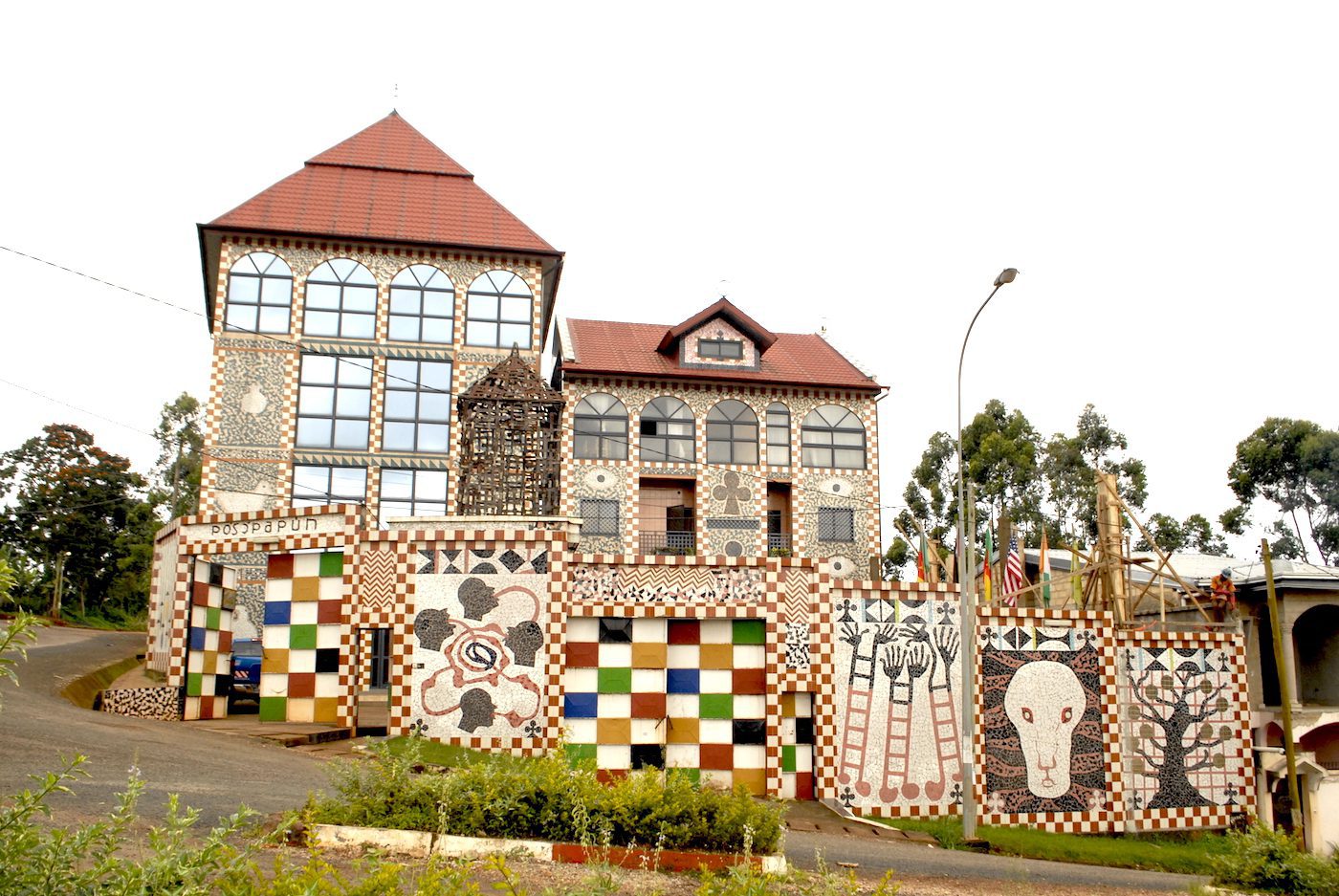Bandjoun, a small town around 300 kilometers from Yaoundé in Cameroon, reaches out to fans of contemporary art with a unique place: Just think of David Hockney meeting Arte Povera meeting Barthélémy Toguo...

Bandjoun Station. Photo: Etienne Nsom
The exhibitions, both permanent and temporary, mounted by this contemporary art gallery, which is located in the western part of Cameroon, open a window on the works of renowned visual artists from Europe like David Hockney and David Nash from the UK, Stephan Balkenhol from Germany, or indeed the French artists Peggy Viallat-Langlois and ORLAN.
Let’s foray into the distinctive space made accessible by Barthélémy Toguo, the Cameroonian visual artist whose achievements continue to brighten the most enlightened minds. An open-minded perspective, breaking down borders. The contemporary art gallery Bandjoun Station, situated in Cameroon’s western region, takes these two expressions literally. The main building of this cultural space opened in 2013 — the property of Toguo, it is a treasure trove containing nuggets from his native country and elsewhere. Local artists proudly show their work alongside some major names from the art elite on the international scene, both in the permanent exhibition on the fifth floor and on one of the two floors below, where the temporary exhibitions are housed.

Roman Opalka, Vis-a-vis an untouched canvas (left), Poster of Roman Opalka (right). Photo: Etienne Nsom
Apart from being a haven for artistic genius, Bandjoun Station also forges a powerful link between cultures. British artists David Hockney and David Nash (it is hard to resist the urge to call them the two Davids) have made the journey. Some other big names from the visual arts scene in Europe have also secured a prominent place for themselves in this gallery: the French artist ORLAN, explorer of the infinite mystery of the human body, and her compatriot Peggy Viallat- Langlois, philosopher of the portrait and the self-portrait, as well as Polish painter Roman Opalka, captured in the irreversibility of time with Vis-à-vis d’une toile “non touchée” …The whiteness of the walls of the gallery projects the wonderful, vibrant story of contemporary art.
Nash continues his struggle in defense of the environment, unveiling a painting with geometric shapes in three colors (yellow, blue, red), representing the purity of nature. Stephan Balkenhol, using just a few lines, executed more or less in black and white, brushes over the paper with the tip of his pencil. He plays the equality card, superimposing portraits of men and women, doing only what is necessary to render the facial expression. And what about the legacy of Jannis Kounellis from Greece, a forerunner of Arte Povera? The radical simplicity of the artist, who died in February 2017, finds its place among the recognized talents that Bandjoun Station affords itself the privilege of putting on show.
FOCUS ON DAVID HOCKNEY
An admiring look at the work of David Hockney. This year, the octogenarian with a fine-tuned sensitivity for color, master of the reflective effect on canvas, is the star turn in a number of galleries and celebrated museums around the world. No need to go to the Centre Pompidou in Paris to admire the Hockney retrospective staged in collaboration with Tate Britain in London and the Metropolitan Museum of Art in New York. Bandjoun, a small town around 300 kilometers from Yaoundé, the capital of Cameroon, reaches out to fans of contemporary art.

David Hockney, Portrait of Peter Schlesinger (left), Small Head of Gregor (center) and The Commissioner (right). Photo: Etienne Nsom
On Thursday, August 31, 2017, a daring ray of sunshine infiltrated the gallery. Quite by coincidence, it illuminated the sepia portrait of Hockney’s protégé and companion, Peter Schlesinger, made in Hollywood in 1976 during the English artist’s crazy hedonistic period. What would local visitors think if they were to guess what this man with the rebellious hair, candid face, and innocent posture represents for Hockney? We might imagine that the people of Bandjoun would be all in a fluster faced with this declaration of love expressed in pencil from one man to another. This would most likely do nothing to stem the artistic enthusiasm and creative audacity of Barthélémy Toguo, who continues his homage to Hockney with two other works: Small Head of Gregory and The Commissioner.
It is Toguo’s wish that this precious heritage be present in the exhibition. He explains: “I chose these artists based on the quality of their work, which is complex and impudent. I didn’t want Bandjoun Station to only show works by African artists, but rather be a place where different worlds intersect. For example, David Hockney with his distinctive drawing style and his singular approach enhances the quality and level of the exhibitions at Bandjoun Station.” There is another more militant reason behind the “European exhibition” in this Cameroonian art gallery. “It gives an opening to young artists. In this way they can understand the history of Western contemporary art. It is important to study the career path, the direction, and the culture of an artist like David Nash and his diversification into lithography and etching, as he moved away from drawing in order to evolve.” Just the ticket to give the hundreds of students and artists-in-residence that Bandjoun Station welcomes each year the chance to rub shoulders a bit more with the subtlety of the works created by the contemporary masters of the movement.
Monica Nkodo is a journalist living and working in Cameroon.
Translated from French by Simon Cowper.
This Essay was first published in our latest Print Issue #8. Read the full magazin here.
More Editorial